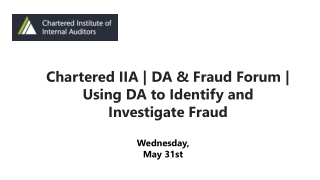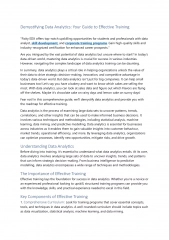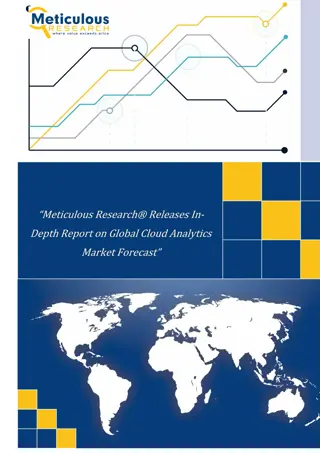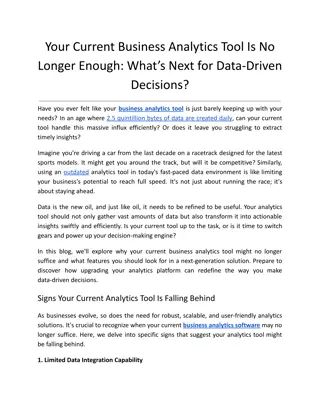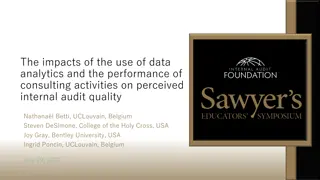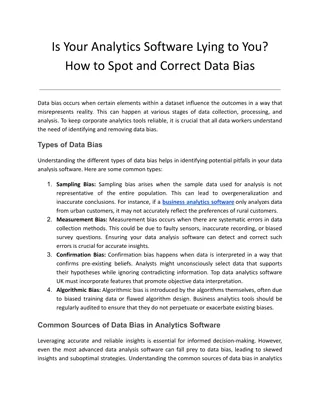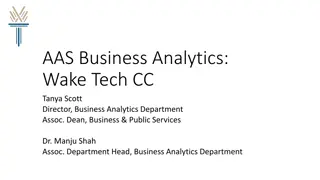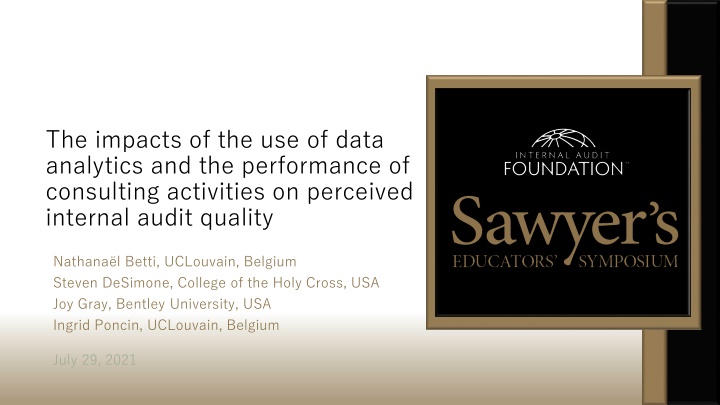
Impact of Data Analytics and Consulting on Audit Quality
Explore the impact of data analytics and consulting activities on perceived internal audit quality in the changing business environment. The research delves into how the use of new technologies and integration of data analytics affect top management's perception of internal audit quality. The study includes hypotheses, methodology, and a background on internal audit quality factors.
Download Presentation

Please find below an Image/Link to download the presentation.
The content on the website is provided AS IS for your information and personal use only. It may not be sold, licensed, or shared on other websites without obtaining consent from the author. If you encounter any issues during the download, it is possible that the publisher has removed the file from their server.
You are allowed to download the files provided on this website for personal or commercial use, subject to the condition that they are used lawfully. All files are the property of their respective owners.
The content on the website is provided AS IS for your information and personal use only. It may not be sold, licensed, or shared on other websites without obtaining consent from the author.
E N D
Presentation Transcript
The impacts of the use of data analytics and the performance of consulting activities on perceived internal audit quality Nathana l Betti, UCLouvain, Belgium Steven DeSimone, College of the Holy Cross, USA Joy Gray, Bentley University, USA Ingrid Poncin, UCLouvain, Belgium July 29, 2021
Research context Business environment increasingly digitalized Organizations adapt their business models, strategies, and processes IT risks gain in importance Integration of new technologies Internal audit function Debate on the performance of consulting activities Objectivity? Integration of data analytics
Research objective Investigate the effects of the use of data analytics and the performance of consulting activities on top management s perceived internal audit quality.
Background Internal audit quality framework (Trotman and Duncan, 2018) Input Process Output Outcome - Technical skills - Experience - Objectivity - Soft skills - Technical production - Service interactions - Reports - Relevant recommendations - Value-add + + + Contextual factors Culture Management training ground Access to staff Digitalisation /use of data analytics
Hypotheses H1: Perceived internal audit quality will be higher when internal auditors use data analytics. H2: Perceived internal audit quality will be higher when internal auditors perform consulting activities. H3: When internal auditors perform consulting activities, perceived internal audit quality will be higher when internal auditors use data analytics.
Methodology Research design: Online scenario-based experiments 120 middle and top managers in the US 2X2 between-subjects experiment Manipulation 1: Use or not of data analytics Condition 1 - 100% assurance, 0% consulting - Analyses based on samples Condition 2 - 100% assurance, 0% consulting - Analyses of full data sets Manipulation 2: Performance or not of consulting activities Condition 3 - 50% assurance, 50% consulting - Analyses based on samples Condition 4 - 50% assurance, 50% consulting - Analyses of full data sets
Methodology Section 1 General context and information about the fictional company Internal audit department Condition 2: Yes Consulting Internal audit department Condition 1: No Consulting Section 2 OR Section 3a General internal audit program Internal audit work Condition 2: Yes Data Analytics Internal audit work Condition 1: No Data Analytics OR Section 3b Section 4 Questions
Results H1 supported regarding the input dimension Perceived competence higher when internal auditors use data analytics H2 supported regarding the process and output dimensions When internal auditors perform consulting activities: quality of the relationship between internal auditors and management is higher perceived relevance of internal auditors recommendations is higher
Results H3 supported regarding the process dimension Interaction effect between consulting activities and data analytics on the perceived quality of the relationship between internal auditors and management
Discussion 1. Data analytics increases the perceived competence of internal auditors 2. Consulting activities increase the perceived relevance of recommendations increase the quality of the relationship with management... ... but without influencing the perceived objectivity 3. Data analytics combined with consulting activities could improve management's perception of IA quality
Thank you for your attention! Questions?

